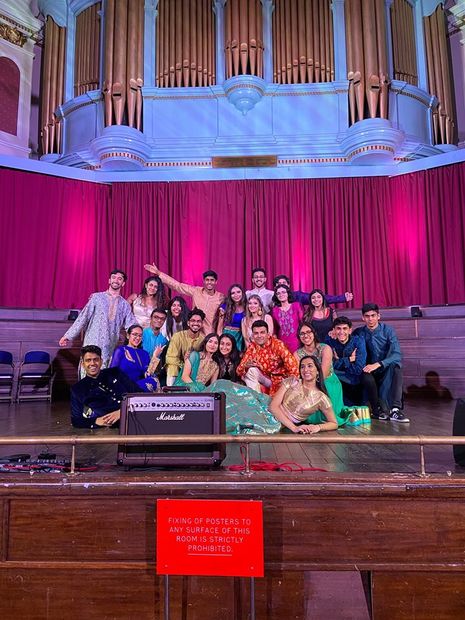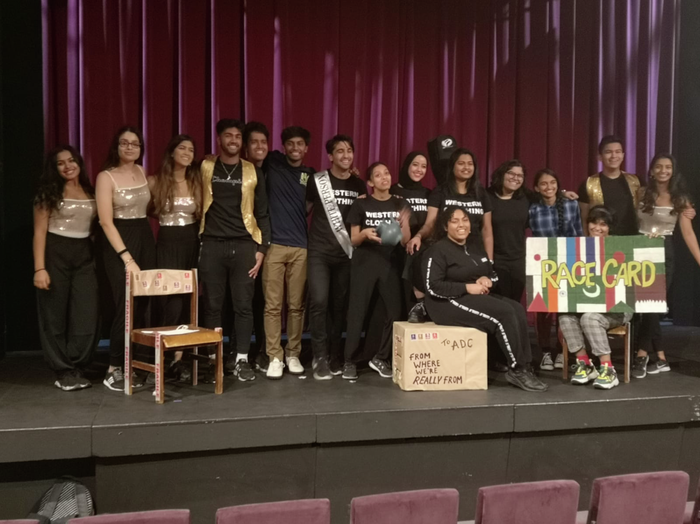From Kathakali to CamDram
‘If we can stage Shakespeare, why not Kathakali?’ Vidya Divakaran explores a different side to Cambridge theatre
If you were to ask the vast majority of South Asians at Cambridge if they have ever engaged with the theatre scene, the resounding consensus would simply be “it’s not my thing.” This is despite the fact that South Asian culture, in all its individual distinct cultures, is filled with art - through music, fashion, dance, and most strikingly, through theatre.
As a South Indian from Kerala, Kathakali is my epitome of theatre. This performance art is as far from traditional Western theatre as you can fathom. Originating about the same time as Shakespeare, the dance-drama is a merging of several folk arts in Kerala, including Ramanattam (the dance drama depicting the Sanskrit epic poem, Ramayana in the South Indian language, Malayalam) and Kalaripayattu (an ancient style of martial art). But what makes Kathakali unique is its synthesis of visual art, vocal performance and instrumental music with trained movement to express Hindu myth. Kathakali is simply spellbinding. Such is one of the countless examples of how performance art in one of many South Asian cultures is as vibrant as the painted faces of Kathakali performers.
And yet, the presence of South Asian communities in Cambridge theatre is by no means one to represent the cultural force there is to offer. Perhaps it is because our culture is not considered as “cultural capital” or comparable to the precedence given to traditional Western theatre.
"Our culture is not considered as “cultural capital”"
But where you can find our culture taking centre stage is Mastana. CUHCS’ Mastana is East Anglia’s largest cultural variety show, put on annually for charity. It is a night produced by and for the South Asian community, which for 25 years has carved out a space to showcase talent that remains otherwise latent. I often questioned why the brilliant performers and creatives around me, who were willing to write sketches, or dance or sing, never considered engaging with the wider Cambridge theatre scene, where their talent could be showcased beyond our own community.
The audience’s laughter at our Shaadi Island sketch, a parody on Love Island for arranged marriages, could have made a Smoker pale into insignificance. But then again, would a Smoker audience react in the same way to Jignesh-uncle boasting that you can call his son, who earns a 6-finger salary, Hrithik Roshan? Most probably not.

The barrier that prevents the South Asian community from engaging with Cambridge theatre could be seen as twofold. An active effort is needed to make the community feel welcome to join productions but, more importantly, to also include the community in our audiences. These efforts come hand in hand.
Take Second Generation Integrated - one of Cambridge’s first productions with an all BME cast and crew. This production was my first time ever engaging with CamDram as the set designer. The reason I applied was simply because it was an all BME production; I would feel more comfortable and less intimidated to ask for help when surrounded by people somewhat less different to me, than if I were to join a predominantly white production.
"The audience’s laughter at our Shaadi Island sketch could have made a Smoker pale into insignificance"
At the same time, Second Generation was making an effort to engage our community as an audience. The ADC was full, with a distinctly large proportion of BME audience members, and the jokes on pronouncing ethnic names and race cards landed with uproar. Being able to laugh with people with the same experiences is what makes comedy memorable and meaningful. The same feeling of shared experience reverberated through the laughs at Nusrath Tapadar’s Hijabi to Hoejabi to Nojabi. It was at these shows that I felt more than a member of an audience, but a member of a community. These productions, funded and supported by Bread, gave the opportunity to laugh for an audience that has been neglected in mainstream Cambridge theatre, in a format that was not an annual large scale celebration like Mastana.
Just as much as we should focus to represent a wider range of stories, cast and crew in our productions, in the same way we should reconsider the audiences that we perform for. This disconnect between the South Asian community and theatre will only be reconciled once the community feels that they are a valued audience, that there is an incentive to watch the plays, let alone be in them. It is through actively carving out spaces for communities that theatre will eventually no longer be a sphere of Cambridge that “isn’t our scene”, “isn’t for us”, “not our thing.”
Now is the time to ask Cambridge theatre and ourselves, if we can stage Shakespeare, why not Kathakali.
Vidya Divakaran is a committee member of Bread Theatre Company and the Co-President of Mastana 2021.
 News / Caius mourns its tree-mendous loss23 December 2025
News / Caius mourns its tree-mendous loss23 December 2025 Comment / Yes, I’m brown – but I have more important things to say22 December 2025
Comment / Yes, I’m brown – but I have more important things to say22 December 2025 News / Clare Hall spent over £500k opposing busway 24 December 2025
News / Clare Hall spent over £500k opposing busway 24 December 2025 Interviews / Politics, your own way: Tilly Middlehurst on speaking out21 December 2025
Interviews / Politics, your own way: Tilly Middlehurst on speaking out21 December 2025 News / King appoints Peterhouse chaplain to Westminster Abbey22 December 2025
News / King appoints Peterhouse chaplain to Westminster Abbey22 December 2025









